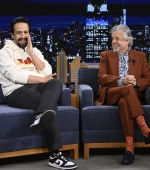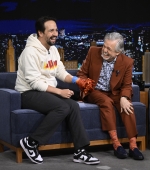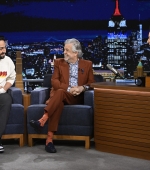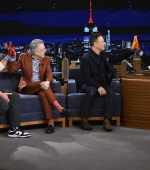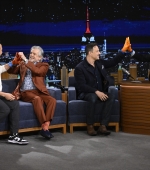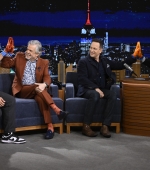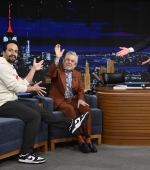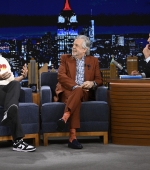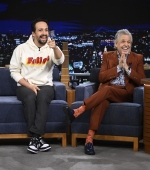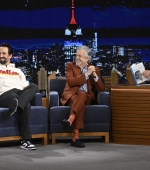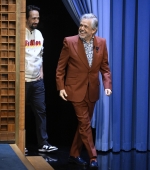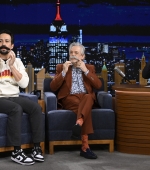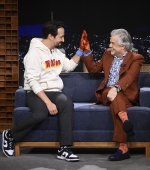We collected the inteviews, video and written, that Lin-Manuel Miranda gave so far to promote Encanto movie.
Let’s start with Billboard.
Under the cut you can find more interviews, videos and articles: That Grape Juice, Scoop with Raya, Siempre Mujer, Entertainment Studios, Screen Rant, Reuters, The Empire Film Podcast, Soundtracking with Edith Bowman, The Hollywood Reporter.
Miranda’s interview starts around 27.00.
The Hollywood Repoter: Which of the two animated projects came your way first? And what made you excited to work on them?
Vivo was originally a project for another studio, and I really wanted to write music for it. I worked on it pretty joyously for a few years, but the studio ended up not making it so the songs all went back into my trunk. Then I had the incredible opportunity to revisit it, with my In the Heights collaborator Quiara Alegría Hudes writing the screenplay and Kirk DeMicco directing and writing as well. It was an amazing opportunity because I had about five years of distance from it. It was always a beautiful story about the enduring power of music and the specificity Quiara was able to give it by creating the character of Gabi, who was one of the most fun characters I’ve ever written for. And then getting to write the Cuba-to-Miami diversity of music, everything from something that feels like Buena Vista Social Club to writing the great ’80s Miami freestyles that my sister used to have on mixtapes.
Encanto really came out of a desire to create something from the ground floor with Disney Animation. I had an amazing time working on Moana, but I was the last guy hired. I was part of an incredible songwriting team that included Opetaia Foa’i and Mark Mancina. I said to my boss, Tom MacDougall, who now is in charge of all Disney music, “I just want to be on the ground floor of the next one.” With [co-writer] Charise Castro Smith, [co-writer/co-director] Jared Bush and [co-director] Byron Howard, our goal was to write about an intergenerational family and not have the central conflict of the movie be some huge quest, but actually the role we play within our families and how we see ourselves versus how we’re seen [by others]. That was really fun stuff to work with, to write songs about how your siblings see you and how you see yourself — and about the black sheep of the family that we don’t talk about, but of course it’s all we whisper about. (Laughs.) Those are extremely universal family things that I was able to write Disney songs about, which was really a thrill.
When you’re writing for a movie, how is the process different from a stage production? How does your process begin?
With an animated production, there’s a lot more people, and I’m very cognizant of that. With Encanto, for example, I knew that, given how many characters we had onscreen, the opening song would have to be as clear as possible a rundown of who is who, how they’re related and what their magical gifts are. Having now written a couple of musicals, I know that the opening number is the thing that’s going to change the most, because you have to write it first — and then you write your whole show and you go back and realize the song isn’t setting up where we went at all. I said, “Give me all the characters and all the powers, and Mirabel will take us and introduce all of them.” Let the song do the work — you can take great leaps of exposition, and if it’s peppy, you can dance to it. I did a deep dive into Colombian music and culture, and I realized that it would be an accordion-led opening number because the instrument is so important and essential to Colombian music.
Once you start hearing from the animators, that informs your story. By the time I wrote “We Don’t Talk About Bruno,” which is another big family song, I had a sense of what each character looked like. And again, that song is another opportunity to check in with all the characters because everyone’s got a perspective on this one family member we’re not supposed to talk about. When I knew Dolores had superpower hearing, I gave her a daring, hushed voice but a really fast patter, and that became a part of how the animators characterized her. It’s just wonderful back-and-forth, not with two other people, but with a whole department.
I imagine, too, that an animated project also expands the boundaries of what you have to work with. There’s so much more you can do visually than onstage, where you’re more limited in how you can portray the magic.
That’s always the most exciting part of it. There’s a song in Encanto called “Surface Pressure.” For my part, I’m just having fun finding nervous metaphors for the character to actually feel. I can write a line like, “The ship doesn’t swerve, hasn’t heard, how deep the iceberg is.” I’m having as much fun as possible with the language, and then [the animators] come back and I’m like, “Oh, shit! They drew a giant ocean liner ship and an iceberg!” It can go as fast as my lyrics, as fast as the speed of the free association. It’s really thrilling. That’s something you can’t do easily onstage with a real human being.
In Vivo, you play the title character. Is the process different when you’re writing a song for yourself than when you write for other characters, like in Encanto? Do you have different instincts when you know it’s a song you will sing?
The great joy of being a songwriter is getting to play all the parts. I can’t tell you how fun it was to write “My Own Drum” for Gabi [in Vivo]. I wanted it to be the lonely-kid anthem to end all the lonely-kid anthems. And as a former lonely kid who knows that our best defense is our own imagination, putting all of that into Gabi was an absolute joy. As soon as I wrote the song, I was like, “I can’t stand hearing this in my voice.” In fact, the first demo the studio heard, I actually asked Quiara’s daughter, because they really wanted to hear a young kid’s voice with all the energy that would bring before the role was cast. That’s also part of the fun of it. As soon as you write it, you look for another voice to find the right key. Part of the process, too, is hearing how it fits in other incredible performers’ voices and then adjusting accordingly.
Once another performer takes on a song, do the music and lyrics evolve?
[In Vivo,] there was a song that I wrote for Dancarino when he was a bigger part of the journey that got cut along the way, but then we [cast] Brian Tyree Henry [as] Dancarino. I know Brian from his musical theater days; I saw him in The Book of Mormon — I knew he could sing sing. I didn’t want to let that opportunity go by, so I wrote, basically, the ’90s R&B song of my dreams, “Love’s Gonna Pick You Up,” and put all of my Jodeci, Shai, Boyz II Men-ness into that because I knew Brian would knock it out of the park.
There’s a funny little run at the end of Encanto when we hear from this character named Bruno, voiced by John Leguizamo. He was like, “You’ve got to write me a rap. I’ve got to be able to tell my grandkids that I did a Lin-Manuel rap.” Which is really heady for me because I grew up memorizing his one-man shows. I really wrote it at his request — it was not a character that sings, but, you know, the maestro asked me.
I also want to talk about tick, tick… BOOM!, which as a film is such a love letter to musical theater. I’m curious how Jonathan Larson influenced you as a songwriter.
The thing that Jonathan Larson did very consciously as a songwriter — which I picked up and continue to do — was not to segregate his musical theater tastes from his music tastes. Jonathan was very much like, “I don’t know why pop music and theater music can’t be friends.” He really advanced that in both tick, tick… BOOM! and Rent. He really wanted to thread the needle of a satisfying evening at the theater that you wouldn’t be ashamed to pump out of your car radio. I was very conscious of doing that when I started writing musical theater, too, because I thought he was right — particularly in terms of the hip-hop and Latin music and music I grew up listening to. I don’t believe music lives in a silo. We silo things to make sense of them, but music transcends all of that. I’ve pinched myself a lot this year thinking about the talent I’ve gotten to work with as a result of the kind of music I’ve been lucky enough to make.
